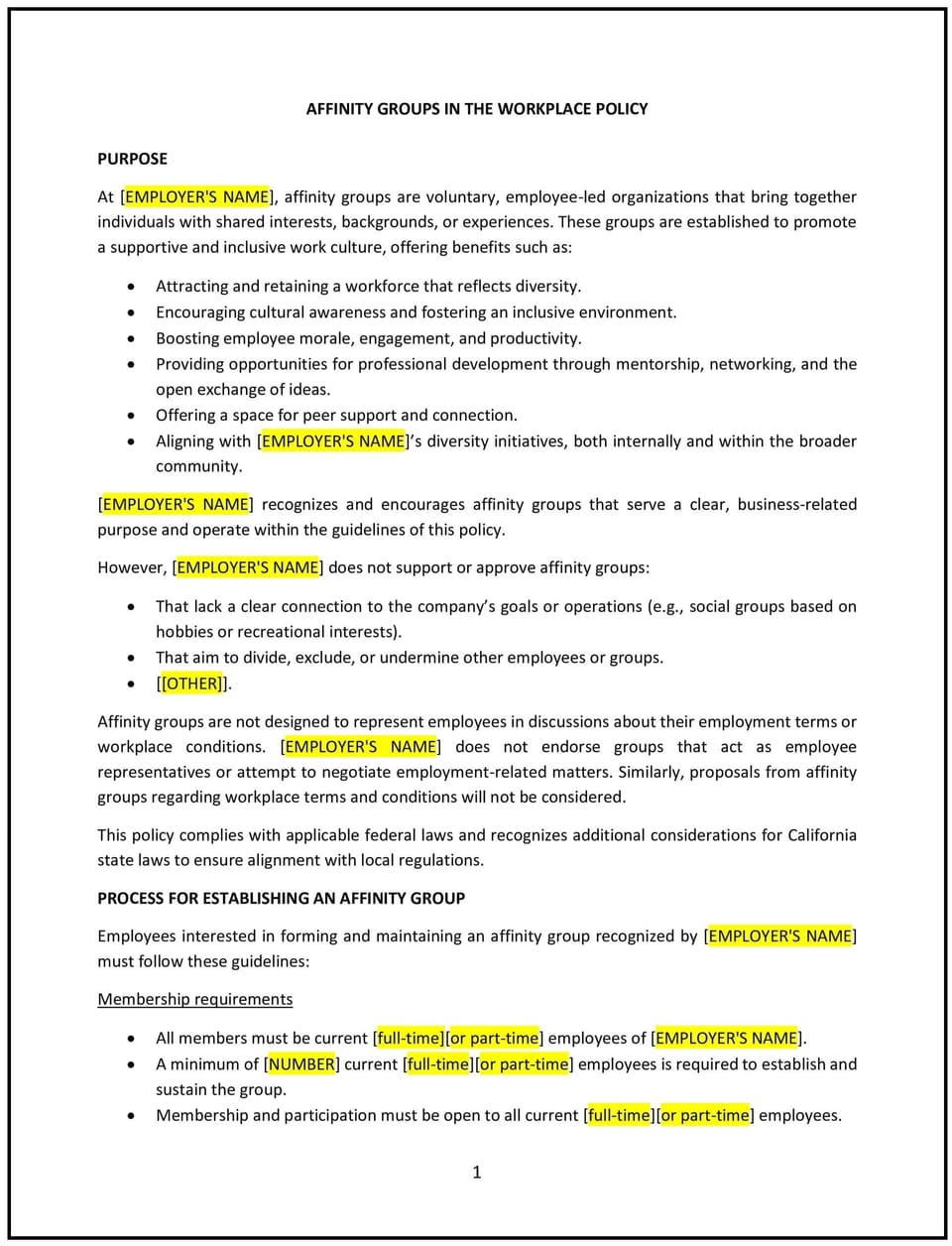Affinity groups in the workplace policy (California): Free template

Affinity groups in the workplace policy (California)
In California, an affinity groups in the workplace policy provides businesses with guidelines for establishing and managing employee-led groups based on shared characteristics or interests, such as cultural identity, gender, or professional goals. This policy promotes inclusivity, enhances employee engagement, and supports compliance with state and federal employment laws.
This policy outlines the purpose, formation, and operation of affinity groups, ensuring they align with the business’s values and objectives. By implementing this policy, California businesses can foster a supportive workplace culture while maintaining operational efficiency.
How to use this affinity groups in the workplace policy (California)
- Define the purpose: Clearly outline the objectives of affinity groups, such as promoting diversity, providing networking opportunities, or supporting professional development.
- Establish formation guidelines: Provide a process for employees to propose and form affinity groups, including criteria for approval.
- Set participation rules: Ensure participation is voluntary and inclusive, and outline behavioral expectations for group members.
- Monitor alignment: Require periodic reviews to ensure affinity group activities align with the business’s values and policies.
- Provide support: Offer resources, such as meeting spaces or sponsorships, while maintaining oversight to ensure proper use.
Benefits of using this affinity groups in the workplace policy (California)
This policy offers several advantages for California businesses:
- Promotes inclusivity: Encourages employees to connect and collaborate, fostering a sense of belonging and respect.
- Supports compliance: Aligns with California’s stringent employment and anti-discrimination laws, reducing legal risks.
- Enhances engagement: Increases employee satisfaction and retention by providing opportunities for connection and professional growth.
- Strengthens culture: Reinforces the business’s commitment to diversity, equity, and inclusion.
- Encourages collaboration: Helps employees with shared interests contribute ideas and initiatives that benefit the business.
Tips for using this affinity groups in the workplace policy (California)
- Address California-specific considerations: Reflect state labor laws, such as those related to anti-discrimination and equal opportunity, in the policy.
- Foster inclusivity: Ensure all employees feel welcome to participate, regardless of their background or identity.
- Train leaders: Provide training for affinity group leaders on effective management and alignment with business objectives.
- Monitor activities: Establish reporting structures to ensure group activities remain productive and professional.
- Review regularly: Update the policy to reflect changes in laws, workplace dynamics, or the needs of employees.
Q: How does this policy benefit the business?
A: This policy fosters inclusivity, improves employee engagement, and strengthens the business’s commitment to diversity, equity, and inclusion.
Q: What are the requirements for forming an affinity group under this policy?
A: Employees must submit a proposal outlining the group’s purpose, membership criteria, and alignment with the business’s values, subject to management approval.
Q: How does this policy support compliance with California laws?
A: The policy is designed to reflect best practices that help businesses manage affinity groups in a way that aligns with California’s anti-discrimination and workplace equity expectations.
Q: What resources can the business provide to affinity groups?
A: The business can offer meeting spaces, funding for approved activities, and management support to ensure groups operate effectively and responsibly.
Q: How can the business ensure affinity groups align with organizational goals?
A: The business can conduct periodic reviews, require reports from group leaders, and provide oversight to ensure alignment with workplace policies and values.
This article contains general legal information and does not contain legal advice. Cobrief is not a law firm or a substitute for an attorney or law firm. The law is complex and changes often. For legal advice, please ask a lawyer.


